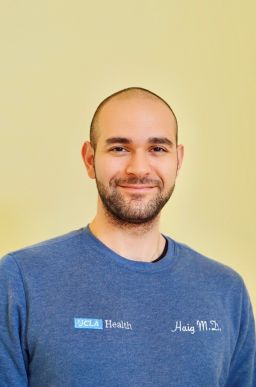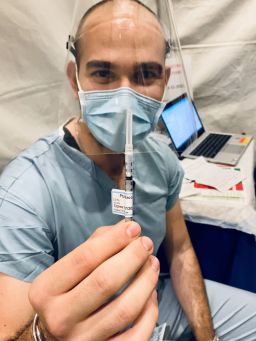Editor’s Note: Haig Aintablian is an emergency medicine resident physician in the University of California Los Angeles Emergency Medicine program and the President of the American Academy of Emergency Medicine (AAEM) Resident and Student Association (RSA). Follow him on Instagram @haig.md. The views expressed in this commentary are his. View more opinion articles on CNN
We’re exhausted. We can’t hide it anymore. The spirited conversations we used to have as we walked through the double doors to our shifts are now dark, depressing updates on what the pandemic has done to our Los Angeles County hospitals. Instead we hear: “The hospitals in the area are diverting ambulance traffic now. They can’t accept any more patients. Soon, we’ll be out of hospital beds too.”

The emergency department used to present our teams with all kinds of medical challenges, most of which we could fix as we patched people up and sent them home. Now the ER is an unrelenting processing plant for one disease – Covid 19. Tired faces behind masks, the buzzing of X-ray machines, the hum of ventilators, the depressing discussions about code status and goals of care – this is how we live now.
Covid has consumed us, but we doctors, nurses, techs, respiratory therapists, paramedics and all other staff are still fighting. We show up to work every day, risking our health and that of our families, to treat you and those you love.
In California over the last three weeks, our emergency departments and ICUs have felt the full force of society’s bad decisions. Thanksgiving, Christmas and now New Year’s celebrations that shouldn’t have happened have now led to countless Covid infections that are claiming their victims and testing our endurance.
No doctor I know has ever seen a situation like this outside of a natural disaster, terrorist attack or war. Our hospitals have so many Covid patients fighting to survive that they have overwhelmed our ICUs and led to overflow units that were never designed for such patients.
If you were to walk into any ER in Los Angeles County today, you’d see the majority of rooms filled with Covid patients. Some are in comas, on ventilators and placed in a prone position (to aid in oxygenation of the lungs in critically ill Covid patients). Some are fitted with large volume nasal tubes sending 50 liters of oxygen into the lungs each minute, and others suffer with what on the surface appears to be just be a cough – but inside their chest lies a pulmonary embolism, or a lung clot that could stop their heart and end their life at any moment.
Our ERs are so continuously inundated with sick Covid patients being dropped off by loved ones or an ambulance with nowhere else to go that we’ve essentially run out of beds for any other emergencies. Never in my life did I anticipate that our hospitals would start turning patients away. Never did I expect that we would tell dispatch to stop sending ambulances. But this is the experience of every emergency physician in Los Angeles County right now.
Every few minutes you’ll hear the sounds of sirens as ambulances pull in. On their way to the ambulance bay at my hospital, they’ll pass a new refrigerated truck trailer for the patients who didn’t make it and which the hospital morgue could no longer handle. Our health care system, it seems, is tearing at the seams.
My 12 years of training as a physician, some of which was in active combat in the Nagorno-Karabakh war, never included a situation like this — one where my hands are tied, where I had limited abilities to help others. I never imagined that society would disregard the guidance of medical professionals and ignore our humble but heartfelt calls for people to do simple things to protect themselves.
The last few months were the most anxious I have ever seen for many members of our staff. I have heard innumerable conversations about the fear of the virus taking away vital members of our depleted team. Nursing and physician staff became bare bones as so many of us became ill with Covid. Doctors off-call began covering Covid units to make sure all patients were taken care of.
And then, finally, we had word of the vaccine.
Many of us in the ER were invited to receive the first dose in waves. When we got the vaccine three weeks ago, we saw a glimmer of hope. A few friends and I posted our vaccinations on Instagram to show our friends and families that we weren’t scared. We knew the science, and we knew this vaccine would be the only way out.
Many friends messaged me with conspiracy theories of microchips and autism, some determined to convince me that I was harming myself or had been indoctrinated in medical school to promote a globalistic ideal to control the people. At first I was in disbelief, but then I was disappointed.
The fight we keep putting on… for what? For backdoor maskless parties and disbelief in modern medicine?

I can continue to describe the frustrations that health care workers have been feeling throughout this pandemic. But instead, I’ll echo our society’s struggle. I, and so many others, understand the frustrations of a closed down world. A struggling economy, family businesses being shuttered each week, many never to recover.
I know this isn’t easy for the average person. I desperately wish we could go back to our normal daily lives — maskless, with visible smiles and dinner dates, weekends out and about, and loved ones hugging and sharing a good time. These things seem like a distant memory.
But we can get there again. It will come again, I promise, but only if we take heed of this pandemic. If we could all hang on tightly to the advice of our doctors and scientists and reach the point of herd immunity through the modern miracle of vaccination, we could get there. The world as we know it will soon get better.
The marathon is almost over. Don’t lose sight of the goal; we’re almost there.

